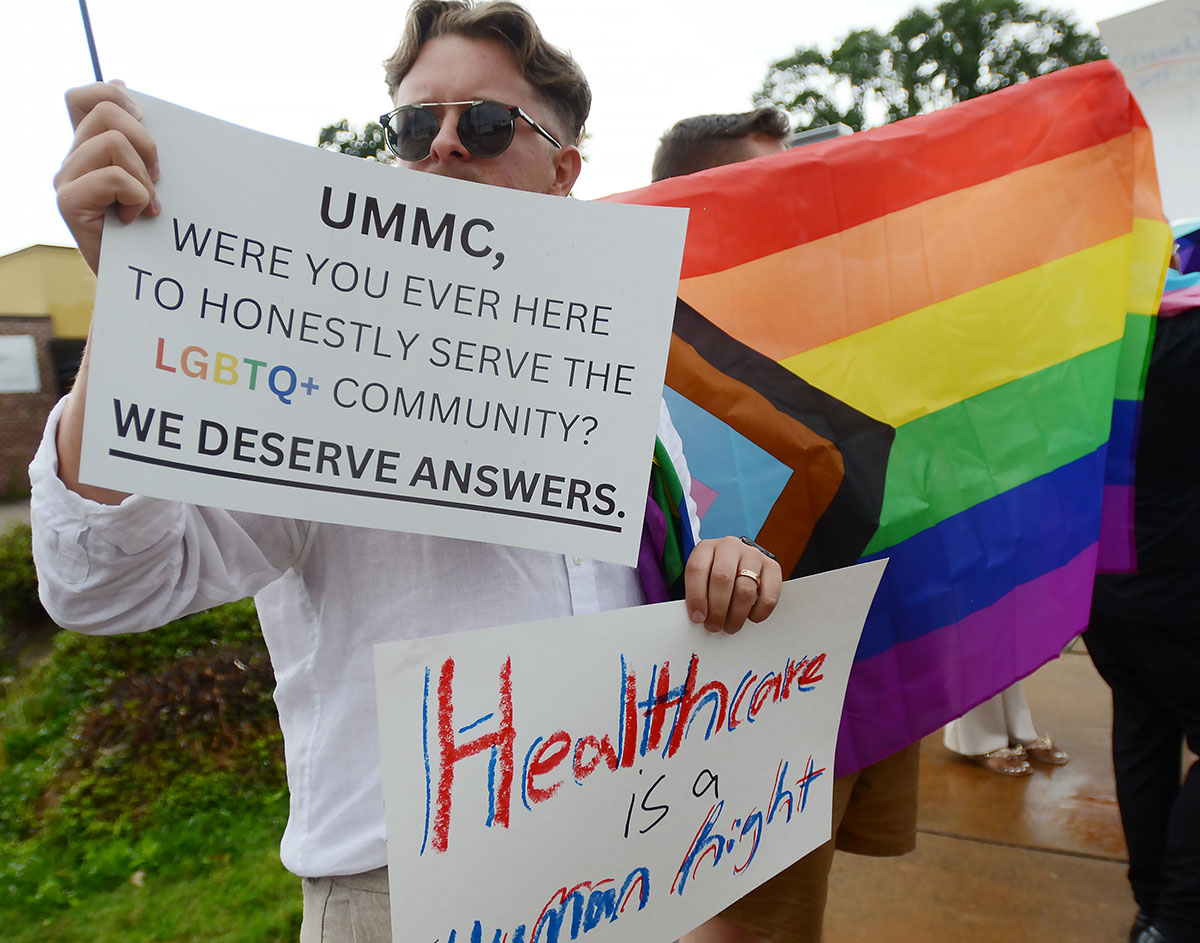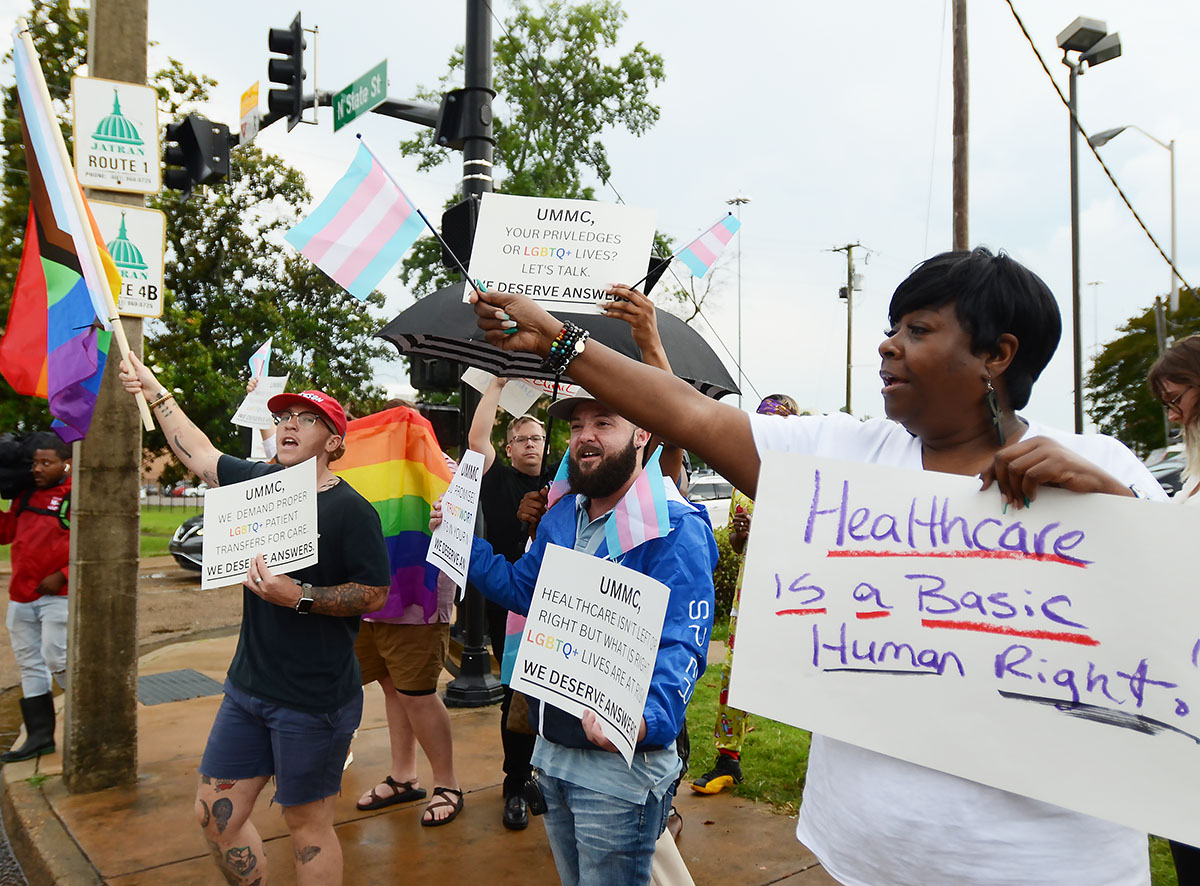Mississippi Today
‘We need to call her out’: Protesters seek to hold UMMC’s Woodward accountable for closing LGBTQ+ clinic

Aaron Lochmann's mom was driving him home from surgery at the University of Mississippi Medical Center when he looked at his phone and got what was perhaps the most poorly timed news of his 19-year-old life. The LGBTQ+ clinic where Lochmann saw a primary care provider and got a prescription for testosterone — and which had recently referred him for the chest surgery he had just undergone — was being shut down by hospital leadership.
Too sleepy from the anesthesia, he didn't know what to think.

But on Tuesday afternoon, Lochmann, still wearing bandages, joined about a dozen other people who protested UMMC's decision to close the TEAM clinic, which stands for “Trustworthy, Evidence-based, Affirming, Multidisciplinary.”
“I'm just appalled and really upset, because I don't have access to basic health care anymore,” he said.
The pioneering clinic, founded in 2015, had been subject to political pressure. A legislative investigation was launched after conservative lawmakers learned the clinic was providing gender-affirming care, like hormone therapy and puberty blockers, to transgender kids. At that point, UMMC executives worked with the clinic's leadership to create a plan to stop treating trans kids at the clinic, according to documents obtained by Mississippi Today.
But last week's decision was made unilaterally. The co-director of the center that oversees the clinic, Alex Mills, was not consulted. And many patients found out they were losing access to health care that aimed to be safe and affirming for the LGBTQ+ community in the same way Lochmann did — from an article in Mississippi Today.
Some patients still have not received a call from UMMC, said Jason McCarty, the executive director of Capital City Pride, a Jackson-based nonprofit that organized Tuesday's protest along with several other LGTBQ+ organizations.
At the start of the protest, held by the intersection on State Street that UMMC employees regularly cross, McCarty was passing out rainbow flags that he purchased with the intention of celebrating Pride Month.
“You want to throw this shit on me during Pride Month?” he said. “We're not gonna allow nonsense like this to rain on our parade.”
The protest's main request, McCarty said, was for UMMC to notify all existing patients that the TEAM clinic was closing and to help them find a new provider that would continue all aspects of their care.
“We understand the clinic is closed,” he said. “We get it. It's not coming back. But we want to make sure people don't get lost in the already bad system that is health care in Mississippi. Is that too much to ask?”
Since Friday, he said he has emailed Dr. LouAnn Woodward, the vice chancellor for health affairs and dean of the School of Medicine, with that request. Woodward hasn't responded.

Much of the protest focused on holding Woodward accountable as the leader of UMMC.
As UMMC employees walked past the protest to their cars — some smiled and waved, others refused to make eye contact — McCarty turned to the group.
“Help me come up with something,” he said. “We need to call her out.”
That's when they began to chant: “Dr. Woodward make it right, health care is a human right.”
Another protester noted that Woodward is the chair of the American Association of Medical Colleges, a medical organization that recently joined several others in an amicus brief opposing Kentucky's gender-affirming care ban.
“She is part of an organization that believes in creating safe spaces for LGBTQ people yet a decision was made recently to take away a safe space for those people — in her own hospital?” said Wiley Smith, who is on Capital City Pride's board of directors. “That's backward.”
The TEAM clinic's closure leaves LGBTQ+ Mississippians with few options in an already deserted health care landscape. The protesters knew of just two clinics — Open Arms in Jackson and Spectrum: The Other Clinic in Hattiesburg — that openly provide gender-affirming care.
Though Spectrum provides telehealth, it's a nearly two hour drive from Jackson, where many former TEAM Clinic patients live. And Open Arms doesn't advertise on its website that it offers gender-affirming care.
“This clinic is where people felt safe,” said Valencia Robinson, the executive director of Mississippi in Action.
Love Latonia, an advocate for trans health care, said that the people who will be most affected by UMMC's closure of the TEAM clinic are Black trans women in part because they lack the financial resources to seek care far away from where they live.
“It's a way to control and to target the most marginalized, because they're an easy target,” she said, adding that lawmakers and other powerful officials in Mississippi “should focus on things that are more serious than people's sexual orientation.”

LGBTQ+ clinics in other states have faced a similar backlash. In Tennessee, the Vanderbilt University Medical Center in Tennessee paused gender-affirming care for minors last October following pressure from Republican lawmakers. Last month, the Texas Attorney General investigated two hospitals that provided gender-transition services to trans youth.
Lochmann, who had been a patient at TEAM clinic since he was 16, said lawmakers don't understand gender-affirming care. He had to wait a year before he could start hormone therapy.
“It's not like they're just giving this care to children just because they asked,” he said.
The clinic's closure, Lochmann added, is yet another blow that is making it really hard to be a trans person in Mississippi right now.
“The clinic didn't get a say in it,” he said. “The patients didn't get a say in it. The fact that it happened out of the blue — it just feels like a huge loss for everything. It's just very hard to exist and feel safe as a trans person in this moment.”
This article first appeared on Mississippi Today and is republished here under a Creative Commons license.
Did you miss our previous article…
https://www.biloxinewsevents.com/?p=247523
Mississippi Today
2024 Mississippi legislative session not good for private school voucher supporters
Despite a recent Mississippi Supreme Court ruling allowing $10 million in public money to be spent on private schools, 2024 has not been a good year for those supporting school vouchers.
School-choice supporters were hopeful during the 2024 legislative session, with new House Speaker Jason White at times indicating support for vouchers.
But the Legislature, which recently completed its session, did not pass any new voucher bills. In fact, it placed tighter restrictions on some of the limited laws the state has in place allowing public money to be spent on private schools.
Notably, the Legislature passed a bill that provides significantly more oversight of a program that provides a limited number of scholarships or vouchers for special-needs children to attend private schools.
Going forward, thanks to the new law, to receive the vouchers a parent must certify that their child will be attending a private school that offers the special needs educational services that will help the child. And the school must report information on the academic progress of the child receiving the funds.
Also, efforts to expand another state program that provides tax credits for the benefit of private schools was defeated. Legislation that would have expanded the tax credits offered by the Children's Promise Act from $8 million a year to $24 million to benefit private schools was defeated. Private schools are supposed to educate low income students and students with special needs to receive the benefit of the tax credits. The legislation expanding the Children's Promise Act was defeated after it was reported that no state agency knew how many students who fit into the categories of poverty and other specific needs were being educated in the schools receiving funds through the tax credits.
Interestingly, the Legislature did not expand the Children's Promise Act but also did not place more oversight on the private schools receiving the tax credit funds.
The bright spot for those supporting vouchers was the early May state Supreme Court ruling. But, in reality, the Supreme Court ruling was not as good for supporters of vouchers as it might appear on the surface.
The Supreme Court did not say in the ruling whether school vouchers are constitutional. Instead, the state's highest court ruled that the group that brought the lawsuit – Parents for Public Schools – did not have standing to pursue the legal action.
The Supreme Court justices did not give any indication that they were ready to say they were going to ignore the Mississippi Constitution's plain language that prohibits public funds from being provided “to any school that at the time of receiving such appropriation is not conducted as a free school.”
In addition to finding Parents for Public Schools did not have standing to bring the lawsuit, the court said another key reason for its ruling was the fact that the funds the private schools were receiving were federal, not state funds. The public funds at the center of the lawsuit were federal COVID-19 relief dollars.
Right or wrong, The court appeared to make a distinction between federal money and state general funds. And in reality, the circumstances are unique in that seldom does the state receive federal money with so few strings attached that it can be awarded to private schools.
The majority opinion written by Northern District Supreme Justice Robert Chamberlin and joined by six justices states, “These specific federal funds were never earmarked by either the federal government or the state for educational purposes, have not been commingled with state education funds, are not for educational purposes and therefore cannot be said to have harmed PPS (Parents for Public Schools) by taking finite government educational funding away from public schools.”
And Southern District Supreme Court Justice Dawn Beam, who joined the majority opinion, wrote separately “ to reiterate that we are not ruling on state funds but American Rescue Plan Act (ARPA) funds … The ARPA funds were given to the state to be used in four possible ways, three of which were directly related to the COVID -19 health emergency and one of which was to make necessary investments in water, sewer or broadband infrastructure.”
Granted, many public school advocates lamented the decision, pointing out that federal funds are indeed public or taxpayer money and those federal funds could have been used to help struggling public schools.
Two justices – James Kitchens and Leslie King, both of the Central District, agreed with that argument.
But, importantly, a decidedly conservative-leaning Mississippi Supreme Court stopped far short – at least for the time being – of circumventing state constitutional language that plainly states that public funds are not to go to private schools.
And a decidedly conservative Mississippi Legislature chose not to expand voucher programs during the 2024 session.
This article first appeared on Mississippi Today and is republished here under a Creative Commons license.
Mississippi Today
On this day in 1925


MAY 19, 1925

Malcolm X was born Malcolm Little in Omaha, Nebraska. When he was 14, a teacher asked him what he wanted to be when he grew up and he answered that he wanted to be a lawyer. The teacher chided him, urging him to be realistic. “Why don't you plan on carpentry?”
In prison, he became a follower of Nation of Islam leader Elijah Muhammad. In his speeches, Malcolm X warned Black Americans against self-loathing: “Who taught you to hate the texture of your hair? Who taught you to hate the color of your skin? Who taught you to hate the shape of your nose and the shape of your lips? Who taught you to hate yourself from the top of your head to the soles of your feet? Who taught you to hate your own kind?”
Prior to a 1964 pilgrimage to Mecca, he split with Elijah Muhammad. As a result of that trip, Malcolm X began to accept followers of all races. In 1965, he was assassinated. Denzel Washington was nominated for an Oscar for his portrayal of the civil rights leader in Spike Lee's 1992 award-winning film.
This article first appeared on Mississippi Today and is republished here under a Creative Commons license.
Did you miss our previous article…
https://www.biloxinewsevents.com/?p=359877
Mississippi Today
On this day in 1896


MAY 18, 1896

The U.S. Supreme Court ruled 7-1 in Plessy v. Ferguson that racial segregation on railroads or similar public places was constitutional, forging the “separate but equal” doctrine that remained in place until 1954.
In his dissent that would foreshadow the ruling six decades later in Brown v. Board of Education, Justice John Marshall Harlan wrote that “separate but equal” rail cars were aimed at discriminating against Black Americans.
“In the view of the Constitution, in the eye of the law, there is in this country no superior, dominant, ruling class of citizens,” he wrote. “Our Constitution in color-blind and neither knows nor tolerates classes among citizens. In respect of civil rights, all citizens are equal before the law. The humblest is the peer of the most powerful. The law … takes no account of his surroundings or of his color when his civil rights as guaranteed by the supreme law of the land are involved.”
This article first appeared on Mississippi Today and is republished here under a Creative Commons license.
Did you miss our previous article…
https://www.biloxinewsevents.com/?p=359301
-
SuperTalk FM7 days ago
Martin Lawrence making 3 stops in Mississippi on comedy tour
-
Our Mississippi Home5 days ago
Beat the Heat with Mississippi’s Best Waterparks
-
SuperTalk FM2 days ago
State auditor cracking down on Mississippians receiving unemployment benefits
-
Our Mississippi Home6 days ago
Charlie’s U-Pik: Opening Soon for the Summer Season
-
Mississippi News Video5 days ago
Jackson has a gang problem
-
Kaiser Health News5 days ago
Medicaid ‘Unwinding’ Decried as Biased Against Disabled People
-
Local News2 days ago
Family files lawsuit after teen’s suicide in Harrison County Jail
-
Mississippi Today4 days ago
On this day in 1950









































